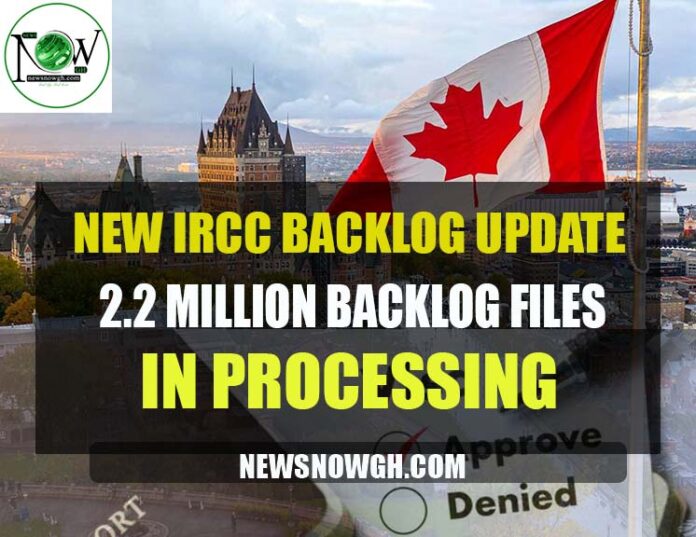New IRCC Backlog Update: 2.2 Million Backlog Files in Processing
2.2 million files remain in the IRCC backlog for processing. Immigration, Refugees and Citizenship Canada recently released an update that highlights the substantial obstacles the organization encounters when handling a large number of applications.
As of March 31, the IRCC had 2.2 million files under processing, including roughly 900,000 in backlog. The organization is still struggling to satisfy processing criteria. This update emphasizes how urgently efficiency and resource allocation must be improved to address the backlog and guarantee the timely delivery of immigration services.
As of March 31, 2.2 million applications were being processed, according to a fresh IRCC statement released on April 29. Each month, Immigration, Refugees and Citizenship Canada updates this data.
There were 892,00 citizenship, immigration, and visa applications in the backlog for the previous month out of the 2.2 million applications in the inventory, exceeding the typical processing norms. In comparison to the March 2024 IRCC backlog update, this figure has barely dropped by 7,200 (0.80%).
The backlog of applications for study permits has recently increased significantly. In terms of study permit applications, the IRCC met service standards in December 2023, but since January 2024, those standards have increased. There was a backlog of 18% of study permit applications in December, rising to 23% in January, 43% in February, and now 46% in March.
IRCC Applications Within Service Standards
IRCC service requirements were being followed in the processing of 1,320,000 applications. Achieving service standards for 80% of applicants for permanent residency is the aim of the IRCC. Just 59% of the files are being processed per service requirements; for applications for temporary residence, this percentage is 55%.
On the other hand, the agency is merely reaching service criteria for citizenship applications, according to recent backlog updates. The service standards figures indicated above indicate that the IRCC is dealing with an increase in new applications for both temporary and permanent residency.
What are the IRCC Service Standards?
Immigration, Refugees and Citizenship Canada plans to process 80% of the files within the time frame it has established for handling different types of immigration visa and citizenship applications. The ongoing backlog that was brought to light in the most recent IRCC update emphasizes the significance of deliberate actions to expedite processing and improve service delivery.
Stakeholders and applicants alike anticipate proactive actions that will speed up application processing and minimize backlog as IRCC navigates these obstacles, ultimately allowing smoother immigration processes for all parties concerned.
Month-by-Month Comparison
A thorough month-by-month examination of the 2023 backlog of data sheds light on the patterns and oscillations. By the end of the year, the backlog had grown by 6.65% as compared to November 30, 2023. The backlog for citizenship applications decreased by 6.04%, the backlog for applications for permanent residency increased significantly by 7.52%, and the backlog for applications for temporary residency increased by 7.42%. These are the notable developments.
Applications Processing within Service Standards
The IRCC has been processing applications following service standards, even though there is still a backlog. 1,271,000 applications were processed as of December 31, 2023, showing a 5.76% increase from November 30, 2023, within the anticipated time frames.
Historical Backlog Data In 2023
An analysis of the IRCC’s backlog statistics from the beginning of 2023 shows variations, with the backlog peaking in October and progressively declining as the year came to a close. During the housing crisis, the government came under fire for taking in an unprecedented number of both temporary and permanent residents.
IRCC Backlog Projections for 2024
The IRCC’s official projections for 2024 indicate a month-by-month decline in backlogs. Forecasts show that the Federal High Skilled and Provincial Nominee Program has a 15–17% backlog. While applications for citizenship and spousal sponsorship are anticipated to backlog at around the same rate, applications for study permits and work permits may backlog at 32–36%, and applications for temporary residence or visiting visas may backlog at 68%.
Challenges Leading to Slow Processing
There are multiple reasons behind the postponed processing at IRCC. Each application requires a detailed case-by-case evaluation, which takes time. Further delaying operations is the fact that, over the past ten years, technological developments have not been properly incorporated into IRCC processes. The problem is made worse by the increase of applications received globally and the backlog that resulted from the pandemic.
Final Thoughts
The difficulties with Canada’s immigration system are highlighted by the latest IRCC backlog update. A thorough grasp of the backlog’s dynamics, variations, and government efforts to address the problem offers a comprehensive picture of the circumstances.
The estimates for 2024 give promise for a progressive decrease in backlogs as the IRCC navigates the complexity; this is in line with the government’s commitment to prompt and effective immigration processing.


